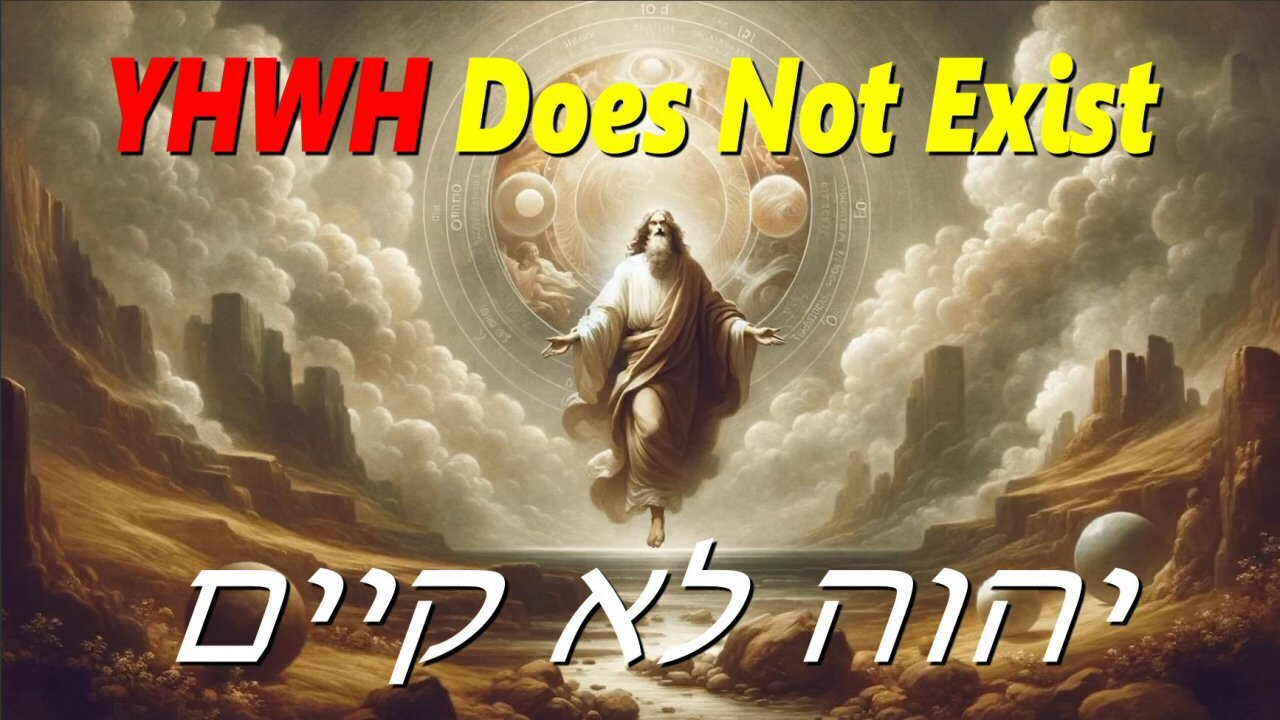Premium Only Content

YHWH Does Not Exist
The fact that YHWH, traditionally revered as the God of the Hebrews, is not the divine creator of the universe but rather a literary construct, crafted by the priesthood of the Jewish people in order to assert their cultural and religious dominance over all other people, invites a deep dive into historical, theological, and anthropological scholarship.
...
The historical development of YHWH from a local pagan deity to the omnipotent creator of the universe can be traced through various stages of Jewish history. Initially, YHWH was one among many gods in an expansive Canaanite pantheon. However, over centuries, through the consolidation of power by the Yahwist cult in Judah, YHWH was elevated, absorbing attributes of other deities like El, Ba'al, and Asherah, thereby transforming YHWH from a regional pagan god into a universal creator. This evolution suggests a strategic elevation by a group seeking to unify and distinguish itself culturally and politically.
...
The transformation of YHWH into a monotheistic deity could be seen as a theological innovation designed to forge a unique identity for the Jewish people amidst surrounding polytheistic cultures in the region. By claiming YHWH as the sole creator of the cosmos and everything in it, the Jews not only differentiated themselves but also justified their survival and existence against more powerful empires. This theological stance provided a narrative of divine election, where being the "chosen people" of YHWH granted them a special status, a narrative that could serve as a psychological and social bulwark against their assimilation or annihilation throughout time.
...
The Hebrew Bible, or Tanakh, serves not just as a religious text but as a historical and cultural narrative. The portrayal of YHWH's interactions with humanity, especially through fictional figures like Abraham, Moses, David, Solomon, and Joshua can be interpreted as literary devices to legitimize the Jewish claim to land, law, and divine favor. The detailed laws, the covenant, and the narrative of divine intervention in Jewish history could be seen as constructs to enforce social cohesion and justify political actions under the guise of divine will.
...
The spread of this narrative beyond Jewish culture, through Christianity and Islam, could be viewed as a testament to its effectiveness as a cultural strategy. By embedding YHWH's narrative into these religions, the original Jewish claim of divine election was disseminated globally, albeit adapted and reinterpreted. This widespread acceptance might not reflect divine truth but the power of a well-crafted narrative aimed at shaping human belief and behavior.
...
Monotheism, particularly the form centered around YHWH, can be critiqued as a cultural construct rather than a revelation of universal truth. Anthropological studies suggest that monotheism might not be an invention of the Jews but a concept that various cultures have independently developed or adapted. However, the specific narrative of YHWH's creation and interaction with humanity as detailed in Jewish texts could be seen as a unique adaptation aimed at cultural survival and dominance.
...
While this polemic might ruffle feathers, it's grounded in the idea that religious narratives often serve broader cultural, political, or social functions. The elevation of YHWH from a local deity to the creator of the universe could indeed be interpreted as a masterful piece of social engineering by the ancient Jews, aimed at securing their identity, survival, and influence in a world of competing narratives. This perspective doesn't necessarily negate spiritual or religious experiences but invites a reevaluation of how divine narratives are constructed and why they still hold power over human societies such as ours.
...
Abraham Never Existed
https://rumble.com/v64l7ps-the-biblical-abraham-never-existed.html
...
Inventing Moses
https://rumble.com/v65dk57-inventing-moses.html
...
Deconstructing Zionism
https://rumble.com/v65wdj1-deconstructing-zionism.html
...
Six Million Reasons to Doubt the Narrative
https://rumble.com/v4yaqwr-six-million-reasons-to-doubt-the-narrative.html
...
Child Sacrifice in Ancient Israel
https://rumble.com/v5epw5x-child-sacrifice-in-ancient-israel.html
...
Dark Messiah
https://rumble.com/vyd27i-dark-messiah.html
...
How YHWH Became God
https://rumble.com/v55z2fa-how-yhwh-became-god.html
...
The Underground History of Israel
https://rumble.com/v54oiso-the-underground-history-of-israel.html
...
Anti-Semitism? Hmmm
https://rumble.com/v1z3lpt-anti-semitism-hmmm.html
...
The Illuminati Plot to Enslave The World
https://rumble.com/v1y66xw-the-illuminati-plot-to-enslave-the-world.html
...
The Protocols of the Learned Elders of Zion
https://rumble.com/v1ynzfd-the-protocols.html
...
Was Christianity Rome's Woke Movement?
https://rumble.com/v5f7jkt-christianity-was-romes-woke-movement.html
...
Which Way Forward for Western Society?
https://rumble.com/v5g8et1-what-way-forward-for-western-society.html
-
 5:20
5:20
FreedomMovement
7 days agoNGOs are Attacking America
248 -
 1:25:35
1:25:35
Roseanne Barr
17 hours ago $53.79 earnedKash Me Outside, Pedos | The Roseanne Barr Podcast #88
104K90 -
 1:21:55
1:21:55
Kim Iversen
13 hours agoMultiple States To BAN mRNA Vaccines | They Want to Make Protesting Illegal, Here's How
76.9K109 -
 7:34:25
7:34:25
Dr Disrespect
20 hours ago🔴LIVE - DR DISRESPECT - WARZONE - IMPOSSIBLE TRIPLE THREAT CHALLENGE
213K32 -
 1:02:45
1:02:45
Tundra Tactical
10 hours ago $27.10 earned🛑 KASH PATEL NEW ATF DIRECTOR??? Breaking News!!!! 🛑
80.7K11 -
 4:31:10
4:31:10
I_Came_With_Fire_Podcast
20 hours agoMy EURO Divorce | HOGG with a side of PAC | Foreign FUNDS Fudged
47.3K5 -
 37:44
37:44
Glenn Greenwald
17 hours agoGlenn On Tearing Down the Military Industrial Complex, Exposing Pro-Israel Indoctrination, and More | SYSTEM UPDATE #411
125K135 -
 4:04:20
4:04:20
Nerdrotic
16 hours ago $54.01 earnedAmazon Takes 007! Hollywood is Lost, Disney Cancels WHO? | Friday Night Tights 342 /w ItsAGundam
185K53 -
 43:27
43:27
Tucker Carlson
15 hours agoRay Dalio: America’s Hidden Civil War, and the Race to Beat China in Tech, Economics, and Academia
180K194 -
 56:56
56:56
Candace Show Podcast
16 hours agoEXCLUSIVE: Taylor Swift Will Be Deposed. | Candace Ep 150
228K165